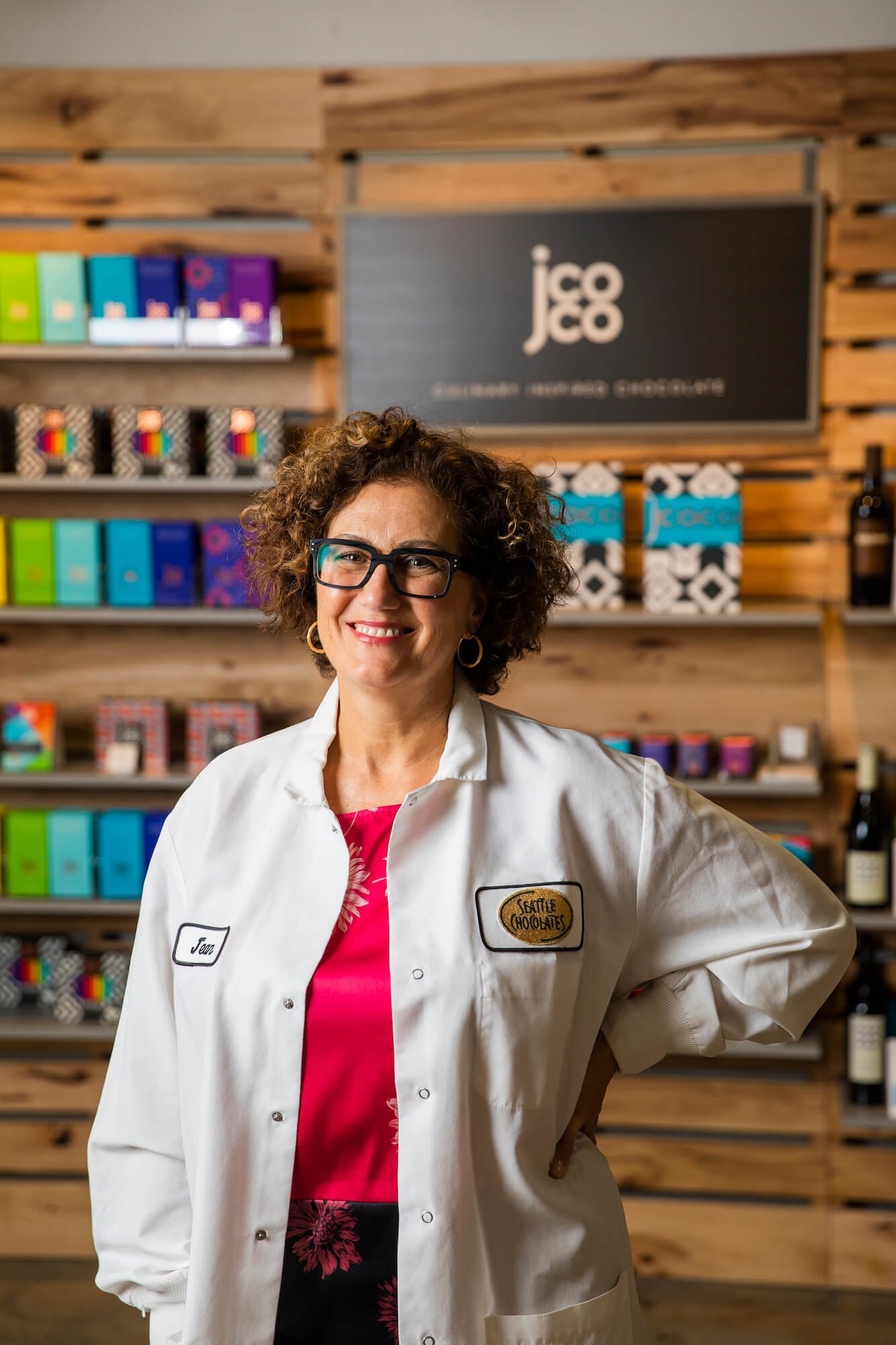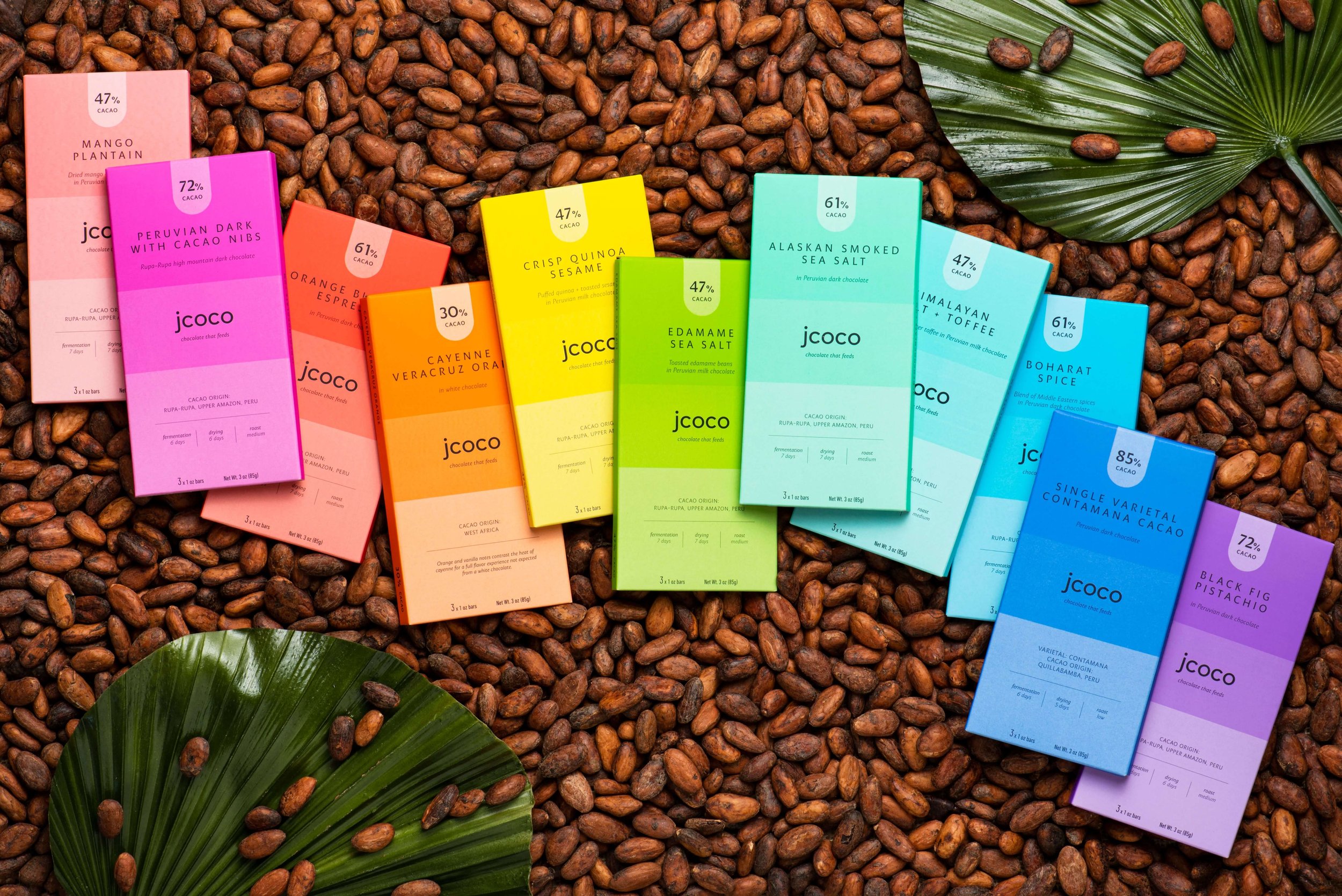How Seattle Chocolate Company & jcoco Chocolate Brands Are Giving Back
Jean Thompson, CEO of Seattle Chocolate Company, understands something fundamental about chocolate: it’s inherently a feel-good product, but it has the potential to feel good in more than one way. “There’s just a lot of great power in chocolate,” she says. While a lot of chocolate brands try to do right by cocoa-producing countries and individual farmers where economics, human rights, and sustainability measures are concerned, (which Seattle Chocolate also does,) Thompson has made a broader philanthropic mission an important part of the brand since she has helmed the company beginning in 2001.
“When my daughter was like 9 or something, she had to have Toms Shoes,” says Thompson. “And when I asked her why, she said, ‘Well, they do something.’ She had no idea what they did, but it didn't matter. She just felt good about wearing the shoes, so I realized early as a businesswoman how important that is to consumers.”
Through various products and initiatives, Thompson and Seattle Chocolate Company give back to the Seattle community and beyond in ways that are very much aligned with the ethos of the brand.
jcoco & Hunger Initiatives
While Seattle Chocolate as a brand was already in place when Thompson became CEO of the company, its chocolates consisted entirely of truffles or “truffle bars,” which always included a truffle layer with various inclusions, such as their Mexican Hot Chocolate and Campers S’mores Truffle Bars. Thompson developed the jcoco brand within Seattle Chocolate as a means of providing a chocolate option that was more origin-based, and “more culinary,” according to Thompson, while having an added layer of feel-good built into the brand.
“There’s so much power in chocolate because it’s America’s favorite flavor,” she says. “Pretty much everyone loves it: they’re going to buy it, eat it, and gift it. And you can give them the power to impact a positive change on their neighbors just by having a built-in philanthropic mission in the chocolate.”
Food insecurity became the issue Thompson chose to address through the jcoco brand from its inception. “It was right after the recession in the late 2000s,” she says. “There were a lot of Americans going uncared for, and at the mercy of the government that was taking away food stamps, and SNAP, etc. I had learned that 1 in 6 Americans was food challenged, and I have always sort of thought of chocolate as needing to move more into the realm of food, and away from just the candy aisle. What is better than stamping out hunger than with food?”
Thompson’s initiative wasn’t about giving away chocolate to feed the hungry, however, but partnering with food banks such as Northwest Harvest, Food Bank for New York City, and San Francisco-Marin Food Bank to give directly to those on the ground feeding the hungry. Ten percent of the net profits from jcoco go directly to these organizations, and according to a statistic on jcoco’s website, more than 3.7 million servings have been donated so far to combat hunger in America.
Seattle Chocolate & Girls Inc.
Because of the success Thompson found through the giving element of jcoco, she knew she had to do something similar with Seattle Chocolate. (It is also worth mentioning that even though it’s not specifically one of their philanthropic initiatives, Seattle Chocolate also commissions working artists for their labels.) “Seattle Chocolate is 80% of our market share because it's the 31-year-old brand,” she says. Finding the right initiative with which to align the larger brand was a process of discovery, however. “There are so many things that you need to think about in terms of what the world needs right now,” says Thompson. “So we struggled a little bit to find our focus.”
Eventually Thompson found a solution within the very makeup of the company: “At the end of the day, 80% of our company is women,” says Thompson. “There are more CEOs named John than there are female CEOs and that needs to change. So what we wanted to do is empower the next generation of girls and women to find their voice and be bold and do whatever they want to do. They want to be a scientist, they want to be a professor, they want to be a business person — they should have the opportunity and a level playing field.” Girls Inc. was chosen as the partner, and as of 2022 10 percent of Seattle Chocolate’s net profits go directly to the charity.
Recently, Thompson had the opportunity to learn firsthand just how important this initiative actually is, care of an email written by an angry customer: “As for the woman owned label on the back, I rolled my eyes,” said the sender. “It’s 2022 not 1922. Is this even an issue anymore?” In response, Thompson posted the comment (anonymously, as to not attack the writer,) to the company’s Instagram account, along with a litany of statistics outlining all the ways in which, while it may be 2022, this is decidedly still an issue.
After the initial posting, the brand’s followers jumped to defend them. “We never had to say a word beyond that,” says Thompson. “Our people did it for us. It matters to our consumers that we're woman owned. We can help carry the flag, and we can do it authentically and proudly, and with purpose, and always kindly. But we'll be a little provocative.”



